UPDATE October 1, 2012: We’re happy to report that Phyllis has just finished another book and is teaching at her writer’s retreat this week.
By Pamela Burke
Phyllis Theroux is a rare writer’s writer, a title reserved for those special people who are revered by their peers. She’s an essayist, author , teacher, and natural story-teller who goes right to the heart of everything she writes. 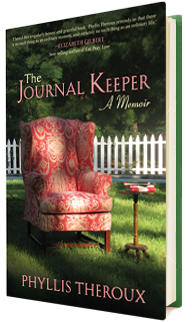
Her new book “The Journal Keeper” is a personal memoir penned during six years of her life. She takes on all of life’s ups and downs in such a relatable and introspective way that the book becomes your friend.
I was fortunate enough to meet Phyllis at Book Passage, a bookstore in Marin County, California. She was speaking to a group about the wonder of the journal–“a flashlight” as she called it.
I’m a big believer in journals and found Phyllis’ so engaging that I had to track her down to learn more about her genius for words and so many other things. She answered the phone at her “Writer’s Cottage” in Ashland, Virginia.
EYE: Not that many people have a Writer’s Cottage in their back yard. Tell me about this special retreat.
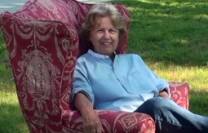 PHYLLIS: I wanted to have a place where people could get away so they could hear themselves and have silence around them. The cottage has things that writers need–books, music, a coffee pot, a sofa to nap, and a built-in editor if wanted.
PHYLLIS: I wanted to have a place where people could get away so they could hear themselves and have silence around them. The cottage has things that writers need–books, music, a coffee pot, a sofa to nap, and a built-in editor if wanted.
People love this bubbly community where everyone waves to each other. It has a warm and friendly atmosphere where newcomers are immediately indoctrinated into the town.
“I write like my first draft is my last. I put down what seems worthy of catching as it goes across my mind.”
EYE: You’re known as a writer’s writer. How you feel about that?
PHYLLIS: Probably I am. By that they mean I take a lot of time. I have a passion for words and how they go together. I’m a slower writer than most and tend to lay down one sentence at a time as I’m making the bracelet. Each link is fastened to the one before. That’s a painful way to write for many people.
I feel that if you’re going to be a writer, all you have to offer is your honesty. Many do first drafts and know that it has excess clay. I write like my first draft is my last. I put down what seems worthy of catching as it goes across my mind.
EYE: When and what kinds of things do you like to write about in your journal?
PHYLLIS: When is every morning. I write about all kinds of things. I wrote about Paris Hilton and media manipulation one day. This is an entry I wrote on September 12th leaving San Francisco:
“Approaching the Waldo Tunnel, I was thrilled by the fog, tumbling like a thin smokey stream in a Japanese painting, down the mountain, bouncing from hill to hill, and pouring through a glade of bay trees which glistened in the wet sun. I can’t remember ever seeing such a bravura performance.”
EYE: Your writing is wonderfully varied and descriptive. Tell me more about your journal…
PHYLLIS: I’m creating my own context as I go along. It’s a record of my thoughts and what I think is important to remember. I talk about the process on my website.
Every once in a while I’ll include something I come across like this in the New York Times:
” The heart goes where the head takes it and neither cares about the whereabouts of the feet.”
EYE: You are very funny.
PHYLLIS: Not everyone thinks I’m funny. I spoke at a book club nearby and someone said that I’m a bit of a moaner at the beginning of the book. I don’t think of myself like that but I might easily have been.
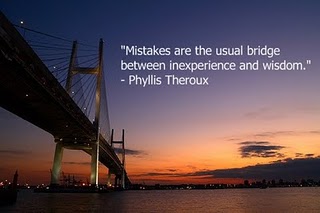
EYE: When did you know you would be a writer, that you could make a living at it?
PHYLLIS: I don’t think I ever said I’m going to be a writer. I picked up the pen to defend myself, to try to understand how I had come to such a sorry place. I was in a marriage with a man I couldn’t get to love me.
The first time I tried to be a writer, I used it as a way to shed some light on my life. Then I went back to bed and looked at pages. I asked myself where did I get that hootzba. Maybe it goes back to my mother who said to all of us, “I think that should go national.” So I said maybe I can go national. And it did.
“I called the article ‘Getting the Hang of It.’ I was trying to get the hang of my life.”
EYE: How did you get it published? Noone knew who you were.
PHYLLIS: I went to local drugstore in Washington D. C. to look at magazines I might send it to. Here I was with 3 children and a workaholic husband. I picked up these typed pages without making a copy and wrote a generic Dear Editor letter so that I could attach it. I looked through the rack and saw The Ladies Home Journal.
So I sent it there. Six weeks later I got a phone call from the Managing Editor. It wouldn’t have happened except an assistent went through a slush pile and plucked mine out of it. I called the column “Getting the Hang of It.” I was trying to get the hang of my life.
“The journal was equivalent to notes you would take during a battle. It kept track of where you were.”
EYE: That’s a great story. People can read it on this site by going to Phyllis Theroux’s essay. What made you start writing journals 30 years ago?
PHYLLIS: Journals preserve the light. I started around age 37 writing in one. You begin when you’re ready. The early ones were ragged but life was ragged then. I was at the point of divorce. It was a pretty bad one and I was with a mean spirited person. Everyday I felt like a Vietnamese woman trying to dodge the enemy.
The journal was equivalent to notes you would take during a battle. It kept track of where you were. The other thing that happened was I was getting to know myself.
EYE: Were you single for a long time after that first marriage?
PHYLLIS: I had a long period between divorce and remarriage and was coming to depend on myself. It was weird for me to think I could lean gracefully on a man again and vice versa. It took me a long time to land on my own feet.
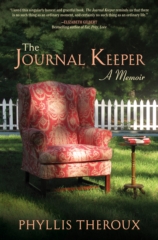 EYE: Before we talk about your remarriage, let’s discuss the cover of your new book. It’s a photo of a wing chair on a lawn. I howled when I saw the video (below) of the making of it.
EYE: Before we talk about your remarriage, let’s discuss the cover of your new book. It’s a photo of a wing chair on a lawn. I howled when I saw the video (below) of the making of it.
PHYLLIS: I came up with a wonderful cover that everybody loved, a photo taken by a local photographer of train tracks in a light snow storm. You can see the light of the train. I thought it spoke to what the book was all about, the tracks of life, etc.
A friend of mine who had seen the cover went to a bookstore in CA and said she had a friend who had written a new book about growing older with all the joys and romance. The owner told her that the book would do well as long as there’s no snow on the cover. She always sent back books with snow on the cover.
So my editor said that we couldn’t take any chances. We needed no negativity. That’s how I ended up on the back of the truck as you’ll see here. I’m very happy with the cover now.
EYE: Tell me about the importance of the chair that takes center stage.
PHYLLIS: That chair is where I do my journal; it’s where I start my day. It glows like a jewel in the early morning. I’ve always had a wing chair in that same spot in front of the wood stove. My friend Wendy said she would like to buy the book and the chair.
EYE: You started a well-respected writer’s group called Nightwriters.
PHYLLIS: It began when my children were still at home, and I didn’t want to leave them to a babysitter. People started to ask me to show them how to write so I started teaching students around the dining room table at night, hence Nightwriters.
Most of them were people with day jobs who wrote a night. As I got more independent, it graduated to meeting at a bookstore and then to summertime at Martha’s Vineyard. Then for ten years I took writers to Italy, then Scotland. Now I do it in California at a truly enchanted place in Healdsburg.
EYE: Your idea of a writer’s well on your website is wonderful. You call it a cyber patio for writers when they run out of fuel. The page has a photo of a friend’s villa in Siena.
PHYLLIS: It was my idea. I put quotes I’ve collected into it. I always wanted a place where people could go for inspiration and then give it. The villa doesn’t tell the whole story. The writer has to do that. And once you experience this power of writing, you want to experience it again.
EYE: I have to ask you about Match.com. What possessed you to get involved in online dating?
PHYLLIS: I’m surprised with how many women my age have done it. I was curious but not desperate to find someone. I’m sociable and it was so convenient. I ended up having two or three dates.
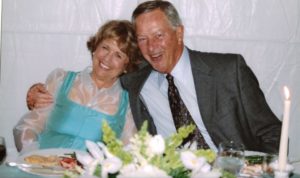 Then the man of my life entered. Ragan was very honest and said he found me very interesting. He said he wasn’t an intellectual. I told him that I didn’t think so as I have a very active life of the mind.
Then the man of my life entered. Ragan was very honest and said he found me very interesting. He said he wasn’t an intellectual. I told him that I didn’t think so as I have a very active life of the mind.
He persisted and he didn’t even have a picture. I was surprised when I saw him; I just liked everything about him. Neither one of us thought we’d find someone in Ashland.
EYE: Did you think you would marry again?
PHYLLIS: I wouldn’t have been interested in someone I couldn’t marry. We met in 2003 and married in 2005. He would have been happy to string it along. I’d made up my mind. He was 66; I was 64. I said we’ve got to do it now.
I really did want to learn to love someone close-up. I was blessed with a lot of friends but wanted the experience of loving on a day-to- day business. You learn a lot about life.
EYE: Were you scared?
PHYLLIS: I had great trepidation. It was so bad that I got shingles. I had such conflict. Talk about being a writer’s writer. I had been very careful about my life. I wrote a consistent book and I didn’t want a book with a character that didn’t belong.
The invitations were out. I went thru the fear very late asking myself what had I done. Then he sent me a Mary Oliver poem called West Wing #2. Any man that has the brains to send that is worth marrying. I had introduced this author to him.
Here’s part of that poem:
“You are young. So you know everything. You leap
into the boat and begin rowing. But listen to me….
There is life without love. It is not worth a bent
penny, or a scuffed shoe. It is not worth the body of a
dead dog nine days unburied. When you hear, a mile
away and still out of sight, the churn of the water
as it begins to swirl and roil, fretting around the
sharp rocks — when you hear that unmistakable
pounding — when you feel the mist on your mouth
and sense ahead the embattlement, the long falls
plunging and steaming — then row, row for your life
toward it.”
Web archive of Panhala postings
I realized after reading it that there will be problems, but that’s the way it is. If more men knew to send a poem…
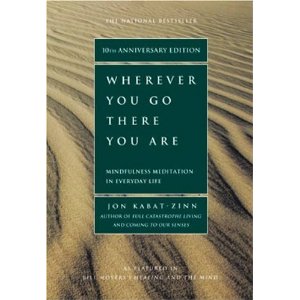 EYE: How do you keep the relationship fresh?
EYE: How do you keep the relationship fresh?
PHYLLIS: We do something to keep sharing together now. When I was in California in May, I said let’s pick a book and each read the same chapter every morning.
Then we would call and chat about it before the day began. We felt closer to each other even though we were apart. It was like a his and her journal.
We were linked to the same source of nourishment. The book was by Jon Kabat Zinn, “Wherever You Go, There You Are.” We felt grounded in each other’s thoughts..
EYE: Another important person in your life was your mother. She’s an integral part of the book.
PHYLLIS: My mother was a critical influence on me. I wanted to write a biography of this amazing woman but couldn’t put the pieces together. I hope to do it at some point.
She was deeply in love with the truth. I would love to be half the person she was or a quarter. The truth was all she really cared about especially as she grew older.
EYE: She urged you to finish writing your Christmas novella “Giovanni’s Light” . I read where it was a 14-year process.
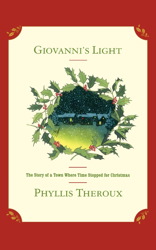 PHYLLIS: It’s a story that I was writing when I started my journal. Writing’s like smoking. If you want to do it, you’ll find a way.
PHYLLIS: It’s a story that I was writing when I started my journal. Writing’s like smoking. If you want to do it, you’ll find a way.
There was a gigantic snowstorm in Washington, DC and I noticed someone out my window after the storm stopped. A woman was sitting outside at a card table with a tea kettle having tea in the sun. This is what happens when a city is forced to stop in its track. People have tea in the snow.
I love to write about how consciousness changes people. When snow immobilizes them, they are forced to retreat inside themselves. It took me moving to Ashland and finding the love of that town to finish it. My mother egged me on.
EYE: What next for Phyllis? I know there’s a book brewing somewhere in that creative mind of yours.
PHYLLIS: Many things. I want to try my hand at a juicy novel about a family in the 50s growing up in a cult. It’s patterned on my family; it was a big and tight until it wasn’t.
I also want to explore establishing something that may be called Book Power where book club members meet and take action after reading a particular story that moves them. There’s one in Bedford, New York that read “Half the Sky,” and now works to help empower girls in India. That’s very exciting.
EYE: What a wonderful idea. Would you close our conversations with a recent journal entry?
PHYLLIS: Here’s part of one from November 27th…
“A bright winter morning. The paperwhite narcissus are in full blooom, standing tall in my silver vegetable dish on the window sill.
As I got out of bed this morning I thought about the amazing worth and power of the imagination, how it literally determines everything: one’s ability to love life, make a living, understand others, and -as a writer-create a story. When the imagination dims, we do too.”
EYE: More wonderful words Phyllis! Thanks for sharing your time and thanks to Duane Berger for your photos.
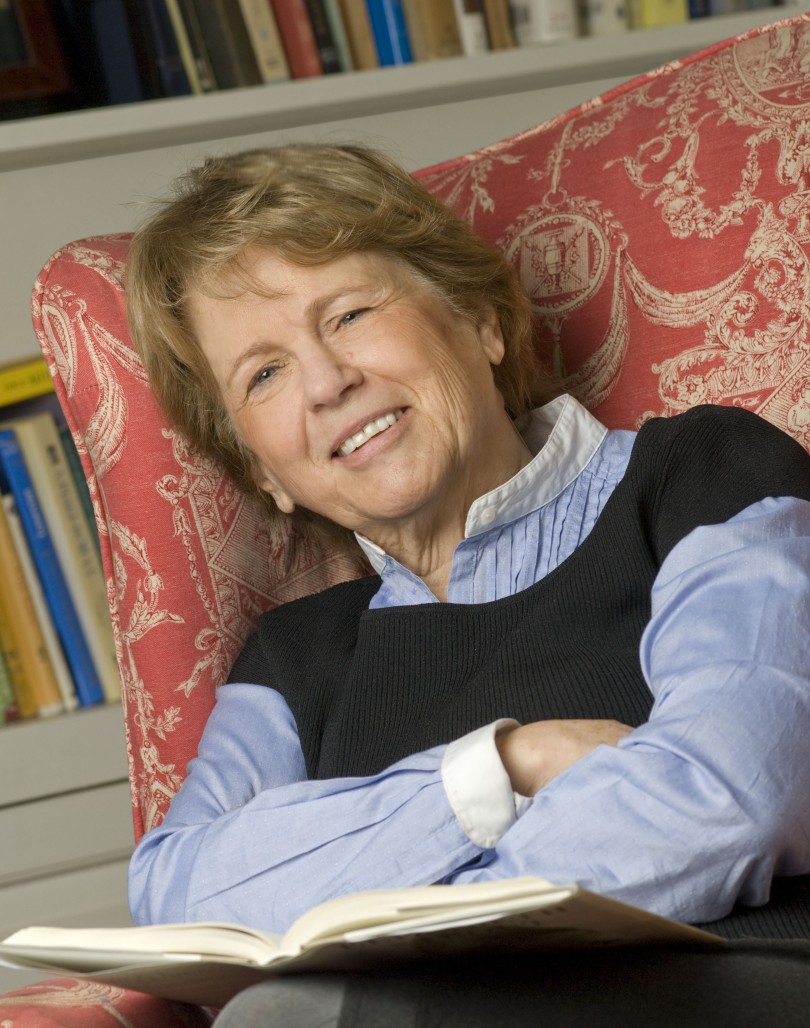
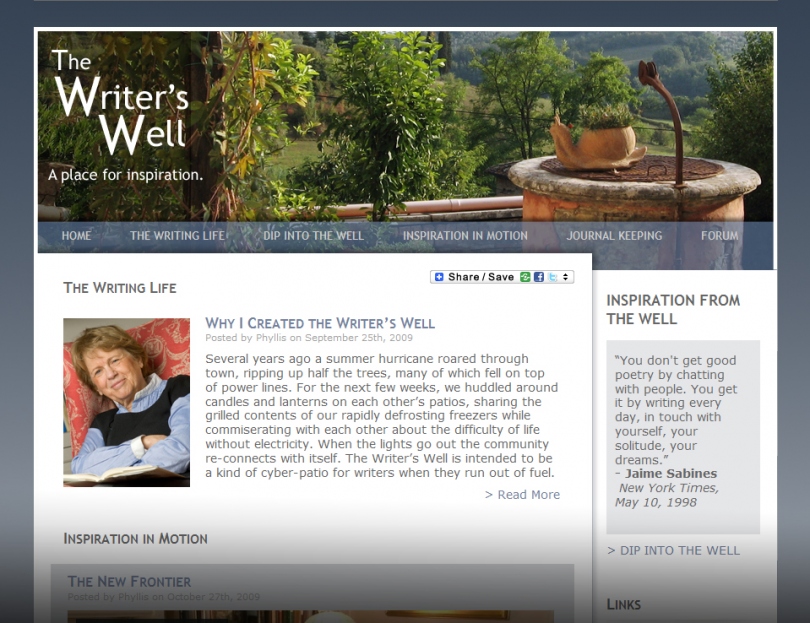




Loved this interview, Pamela. Thanks for introducing me to Phyllis Theroux!